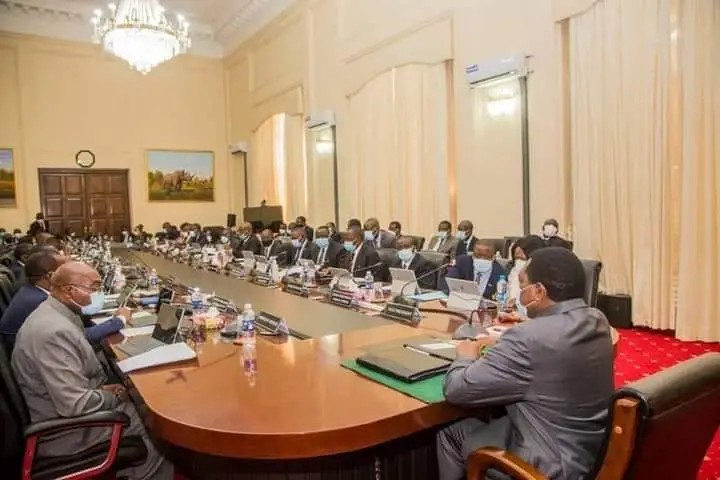2024 First Cabinet Meeting
The President of the Republic of Zambia, Mr. Hakainde Hichilema, called for the 1st Cabinet Meeting in the Year 2024, on Monday, 22nd January, 2024, at State House, to deliberate on policy and legislative matters that are supposed to facilitate socio-economic development for the good of the people.
Cabinet made the following decisions:
1. Domestication of Arms Trade Treaty.
Cabinet, understanding that Zambia is a member of the United Nations, and at the same time, known globally as a peace-loving nation, approved the domestication of the Arms Trade Treaty (ATT).
Cabinet agreed that Zambia has a duty to ensure that conventional arms, in particular small arms and light weapons, which are a major factor to armed conflict and violence and which in many instances are associated with violations of human rights and international humanitarian law, are well regulated to minimise their negative effects on humanity in general and women and children in particular.
The Arms Trade Treaty is a multilateral legally binding agreement that establishes common standards for the International trade of conventional weapons and aims to reduce the illicit arms trade. The ATT is an attempt to regulate the International Trade of Conventional Weapons for the purpose of contributing to international and regional peace, reducing human suffering and promoting cooperation, transparency and responsible action by and among States.
2. Establishment of a Special Purpose Vehicle for investment and trading in mineral resources in the mining sector.
Cabinet also approved the establishment of a Special Purpose Vehicle (SPV) for investment and trading in mineral resources in the mining sector.
The establishment of an SPV will mitigate the uncertainties by assuming a new model based on actual production sharing which will allow for benefits to accrue from the share of production rather than wait for dividends from profit, so as to ensure maximum benefit by the citizens from their natural resources such as the minerals.
3. Construction of the Zimbabwe – Zambia Finished Products Pipeline and the Mozambique – Zambia Multi-Purpose Petroleum Products Pipeline.
Zambia heavily relies on imported petroleum products to meet the diverse energy needs of its population and industries. Consequently, the country’s economy is highly susceptible to fluctuations in international oil prices and exchange rates.
In view of this, Cabinet approved the construction of the Zimbabwe-Zambia finished product pipeline and the Mozambique-Zambia multi-product petroleum products pipeline by the private sector, in order to ensure security of supply of petroleum products at affordable prices going forward.
Cabinet is well aware that as the country’s population continues to urbanise and industries expand, the reliance on petroleum-based energy sources for transportation, manufacturing and power generation has become increasingly pronounced, hence the need to accordingly plan for the future.
4. Accession of Zambia to the African Circular Economy Alliance.
Cabinet approved that Zambia joins the African Circular Economy Alliance (ACEA) Charter, an International Organisation dedicated to spur Africa’s transition to a circular economy which delivers economic growth, jobs and positive environmental outcomes.
The joining of the alliance will help the country in areas such as, sharing best practices for the creation of legal and regulatory frameworks; building of partnerships for financing and creation of circular economy projects across the countries; advocate for and raise awareness of the circular economy at national, regional and global level; and encourage the creation of new projects and partnerships within Zambia or with multiple countries.
5. Legislation Matters:
(a) Statutory Instrument: The Road Traffic (Public Service Vehicle) (Amendment) Regulations, 2023.
Cabinet approved the issuance of the Road Traffic (Public Service Vehicle) (Amendment) Regulations, 2023, in order to ensure effective regulation of online ride-hailing services in the country and the drivers of online private hire taxis.
The introduction and growth of online car hailing services in the country has come with some lacunas in the law that need to be addressed to ensure that the services are provided within the confines of the law while ensuring the safety of both the travelling public and the drivers of private hire taxis.
Therefore, the Statutory Instrument aims at ensuring that key provisions for the regulation of online car-hailing services are put in place. Further, in order to ensure safety of passengers and drivers, the Statutory Instrument provides for mandatory provision of information relating to the vehicle owner and driver’s residential address and contact details, copies of the vehicle owner and the drivers national registration cards including a copy of the registration certificate for the vehicle.
(b) Statutory Instrument: The Health Professions (General) (Amendment) Regulations, 2024.
Cabinet approved the amendment of Statutory Instrument No. 27 of 2018 – The Health Professions (General) (Amendment) Regulations, 2018, in order to reduce the cost of doing business in the health sector as well as ensuring compliance by public health facilities, private health facilities and health practitioners to set health care standards.
The risk of maintaining high fees is that it deprives both public and private health facilities of revenue that could be used to improve service delivery such as human resource, equipment and medical supplies. Further, high fees deter new entrants into the health sector and cause a financial strain on already existing facilities. This results in reduced number of health facilities which invariably exposes the public to compromised health care services and could lead to high morbidity and mortality rates.
(c) Statutory Instruments: The Customs and Excise (Remission), 2024.
In order to facilitate production in the country through private sector participation, Cabinet also approved economic measures which will reduce the cost of production for local manufacturing companies in steel, mining equipment and spares so as to make companies investing in these areas more economically viable and competitive.
It is envisaged that these measures will attract private sector participation and ensure quality investment in steel and mining equipment and spares manufacturing, stimulate economic growth, and further, supplement national efforts to position the country as a manufacturing hub in the region.
6. Ratification of Convention and Agreement:
(a) Ratification of the Global Convention on the Recognition of Qualifications Concerning Higher Education.
During the Meeting, Cabinet also approved the ratification of the Global Convention on the Recognition of Qualifications Concerning Higher Education in order to affirm Zambia’s international cooperation in the promotion of international mobility, as well as communication and cooperation regarding fair and transparent procedures for recognition, and quality assurance and academic integrity in higher education at a global level.
The Convention enhances international cooperation in higher education, of the mobility of students, workers, professionals, researchers and academics, of changes in scientific research, and of the different modes, methods, developments and innovations in teaching and learning globally. Zambia acceded to the Revised Convention in 2021.
(b) Ratification of the African Regional Cooperative Agreement for Research, Development and Training Related to Nuclear Science and Technology (AFRA) Agreement.
Cabinet also approved the ratification of the African Regional Cooperative Agreement for Research, Development and Training Related Nuclear Science and Technology (AFRA) Agreement.
Ratifying the African Regional Cooperative Agreement for Research, Development and Training Related Nuclear Science and Technology will provide Zambia several benefits which include access to technical support, expertise, and resources provided by the International Atomic Energy Agency (IAEA) and other AFRA member states. This can help the country to enhance its capabilities in nuclear science and technology, improve their infrastructure for the safe and secure use of nuclear technology, and address challenges related to nuclear safety and security.
7. Hosting of the 25th African Association of Insect Scientists International (AAIS) Conference.
Cabinet has generally agreed that Zambia should host as many regional and international conference as possible, in order to promote tourism. In this vein, Cabinet approved the hosting of the 25th African Association of Insect Scientists International (AAIS) Conference, to be held in November, 2024, in Livingstone.
Cabinet is of the view that research in insect science enables the development of effective pest management strategies, including the identification of pest species, monitoring their populations, and implementing targeted control measures. This helps farmers protect their crops, improve agricultural productivity, and ensure food security, and as such, the AAIS Conference is important to Zambia going forward.
The African Association of Insect Scientists International was established in 1978 as a platform for African Entomologists to exchange information in Insect Science. Since 1978, the Association has facilitated 24 conferences in various countries in Africa, one of which was successfully hosted by Zambia in 1980.
8. Approval of Policies:
(a) The National Arts Policy.
Cabinet approved the Revised National Arts Policy and its Implementation Plan. It is important that the arts sector is well guided through a comprehensive policy and legal framework, in order to stimulate and facilitate for its meaningful growth.
It has been realised that in the past, the sector was faced with a number of challenges which included limited growth and unfavourable working conditions for the artists. These challenges, consequently, have undermined the development of the arts sector thereby reducing its capacity to effectively contribute to national development.
The implementation of the Revised National Arts Policy will, therefore, promote the growth of the arts sector, increase utilization of digital technologies, promote investment and development of the arts infrastructure and spaces, promote research for the development of the sector, strengthen the legal framework for a thriving arts value chain and ensure that national values, principles and identity are promoted.
(b) The National Film Policy.
Another Policy approved by Cabinet is the Revised National Film Policy and its Implementation Plan. The Policy aims at providing policy direction on the development of the film industry in Zambia through provision of the legal framework, film infrastructure and equipment, structured coordination mechanism, adequate skills, financial and technical support.
Further, the Policy will also address other emerging issues surrounding the film industry which include, rampant digital piracy affecting film maker profits, lack of access for local content in different markets and ensuring that film organisations operate in a structured manner.
The film industry, if well developed, has greater potential to attract investment in the industry and contribute to Zambia being an attractive film destination, as well as contribute to job creation and improved livelihoods of those involved in arts.
9. Appointment of the Mining Appeals Tribunal.
Cabinet approved the appointment of a five (5) member Mining Appeals Tribunal in line with the Mines and Minerals Development Act, No. 11 of 2015. The law provides for the appointment of five (5) Members to adjudicate and resolve issues arising from cases from the Minister, which have been contested for by applicants or holders of mining and non-mining rights who are not pleased with the decision of the Mining Licensing Committee.
Therefore, this body will seek to among others, provide justice and expedite the disposal of cases in the mining sector as it also conducts investigations and decides upon any matter affecting applicants or holders of mining or non-mining rights.
10. Appointment of members of the Africa Peer Review Mechanism (APRM) National Governing Council (NGC).
Cabinet also approved the appointment of an eleven (11) member National Governing Council (NGC) of the Africa Peer Review Mechanism (APRM), in order to provide for oversight in the implementation of the APRM programmes and guidelines in the country.
Zambia acceded to the African Peer Review Mechanism (APRM) on 22nd January, 2006 at the African Union (AU) Summit held in Khartoum, Sudan.
The appointment of members to the NGC will, therefore, give a renewed oversight to the implementation of the APRM programmes in Zambia, and provide an opportunity for bringing new ideas and persons with skills in the focal areas of the APRM and the African Union Agenda 2063.
Source: Ministry of Information and Media – Zambia



